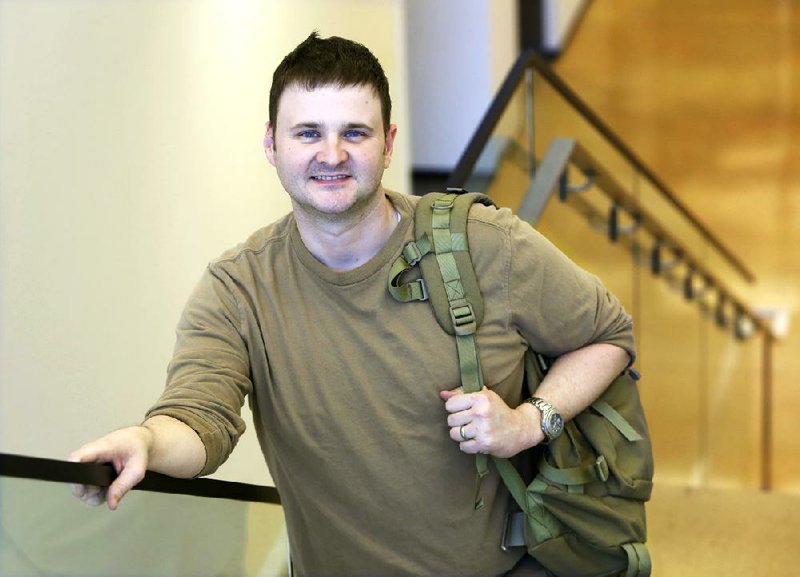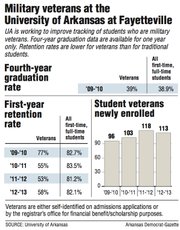Correction: Danny Pugh is vice provost for student affairs at the University of Arkansas at Fayetteville. Melissa Harwood-Rom is dean of students. Pugh's title was incorrect in this article.
Student life can be difficult, even for someone who has traveled the globe.
Taylor Weeks, 27, was deployed to Italy and Africa while serving in the Navy for five years. Now, he’s a senior studying English at the University of Arkansas at Fayetteville, where he’s president of Razorback Student Veterans.
For veterans returning to the classroom, “some of the difficulties are remembering to study and how to do it,” Weeks said.
Others describe struggling on campus because of wartime experiences or just having a different perspective than their younger classmates.
Six of every 10 student veterans entering UA return the next fall for their second years, below the retention rate of traditional students, according to data from 2009-10 through 2012-13.
A university task force convened in 2008 by UA Chancellor G. David Gearhart recommended ways to build a “veteran-friendly” campus.
Like many schools, UA has not comprehensively tracked the academic outcomes of student veterans, but an effort is underway at the UA campus to do that, possibly by fall.
With UA leaders vowing to boost overall six-year graduation rates to 70 percent by 2021, Gearhart - in response to a question about acceptable graduation rates for veterans - noted the challenges that student veterans face.
“Someone who has served our country, put their life in harm’s way and is making an effort to attain their education, frankly may need a little extra time to finish the job. Sometimes veterans’ schooling can be interrupted due to deployment or family-care needs,” Gearhart wrote in an email.
SPECIAL CIRCUMSTANCES
Over the past four school years, about 430 veterans enrolled as undergraduates for the first time at UA, making up only a tiny percentage of an overall undergraduate population of more than 20,000 students. Student veterans say they like supports recently put in place by the university but have at times felt isolated on campus.
Michael Francis joined the Marine Corps Reserve out of high school in 2006. After a deployment to Iraq, he enrolled in UA for the 2009 spring semester.
“They were just getting the veterans stuff up and running. They had the veterans office, which helped me out if I needed anything,” Francis said, referring to the Veterans Resource and Information Center.
The center opened five years ago. Since 2012, it has helped more than 900 veterans and more than 400 dependents of veterans, said Erika Gamboa, director of the center and herself an Army Reserve veteran.
Gearhart called the center “the defining way we’ve helped veterans the most.” A part-time staff member paid by the U.S. Department of Veterans Affairs also helps at the center, where student veterans receive assistance in everything “from pre-admissions, admissions, enrollment, to referring to on-campus services, helping them apply for benefits, work with disability officers, work with the VA, career opportunities, and internship opportunities,” Gearhart wrote.
Not every veteran’s experience at UA has ended happily, however.
For three semesters, “my grades were pretty good,” Francis said. But his studies were interrupted by another deployment, this time to Afghanistan.
Upon his return to the U.S., he enrolled in summer classes. That fall, when the campus became more crowded, he began having difficulties.
“You’ve got to see it from my point of view. Going over there and doing that stuff, you don’t really know who the enemy is. Everybody’s dressed the same. There are no uniforms,” Francis said. He struggled to focus in large classes.
“When you get in that sort of environment, granted you’re still back home safe. But at the same time, when it comes to a large group of people like that, you’re not sure who’s a bad egg or not,” Francis said.
He started missing class. In a trigonometry course, he explained his absences and difficulties to an instructor. “They were understanding about it,” Francis said, and he was not penalized for the absences.
But he faced another problem at UA. Before going to Afghanistan, Francis hadn’t formally withdrawn from classes. That resulted in a semester’s worth of failing grades and being placed on academic probation. Last fall, the horticulture major didn’t meet the minimum 2.0 grade point average, and he is no longer a UA student.
Having completed his military commitment, Francis now hopes to attend a community college.
Francis said he had spoken with some veterans who had gone to the campus disability center for help and had been assigned a note-taker to help them keep up with their classes, something he didn’t do.
“Mostly I figured it was something I was on my own” to deal with, Francis said. “I was talking to someone at the VA. I never really talked to someone at the university.”
ADJUSTMENT PROBLEMS
After graduating in May from UA, Beau Fugitt now studies law at the W.H. Bowen School of Law at the University of Arkansas at Little Rock .
Before college, he was a Marine for four years on active duty, which included a deployment to Iraq.
“I had the full post-9/11 GI Bill. It paid for all of my tuition and also gave me a stipend every month,” Fugitt said. While he also worked some as a bartender, neither finances nor the academic workload were problems for him while he was at UA, he said.
But university life wasn’t always easy.
“The hard part was adjusting to the culture. You go in, you’re older than a lot of people. You have experienced the world, experiences that a lot of people can’t relate to,” Fugitt said.
Weeks said a student recently visited the Razorback Student Veterans office after a close friend was killed in action. “He needed somebody to talk to,” said Weeks, who plans to pursue a master’s degree with a focus on writing for veterans.
Razorback Student Veterans, which has about 180 members, has the “main purpose” of helping students adjust to campus life but it also has an office where veterans can go if they are dealing with emotional stress, Weeks said.
Gamboa said the on-campus veterans center takes an individualized approach to students.
Yet reaching student veterans isn’t always easy, said Karen Hodges, executive director of the UA Academic Success Network.
“It’s better now, but it’s been the whole issue of getting information to the veterans of the services that are on campus,” said Hodges, a member of the 2008 task force and of a committee that meets to discuss student-veterans issues.
Fugitt said he eventually went to the veterans center for help with writing a resume. For most of his time at the UA, “I just didn’t know those resources were available to me,” he said.
TRACKING THE NUMBERS
The university doesn’t track student veterans in graduate school, but they also use the center.
Kenny Bierman is in his first semester as a graduate student in UA’s business school.
His accomplishments include an undergraduate degree from the University of Oklahoma and a master’s degree earned while he was on active duty.
Bierman is an 11-year Air Force veteran who was forced to retire because of a back injury. He said his real-world experience doesn’t always mean classroom success.
“My last job, I directly supervised 180 people,” Bierman said. Now, in his first semester, “I take a test and I don’t get 100 percent on it, where I used to be the expert,” Bierman said. He said he struggles “every day” to adjust to campus life.
Nationally, more attention is being paid to student veterans.
Last year, the UA joined about 250 colleges and universities in agreeing to follow eight “keys to success” laid out by President Barack Obama to help student veterans. The initiative includes a call for coordination and centralization of campus efforts for veterans and the utilization of “a uniform set of data tools” to track veteran graduation and retention rates.
Only about one out of three colleges and universities tracks the outcomes of student veterans, according to survey results published in a 2013 report by a national organization of student administrators.
More than $30 billion in tuition and benefits have gone to student veterans or families of veterans under the Post-9/11 GI Bill, according to the VA. The program began in 2009.
“Americans were asking, rightfully so, what are we getting for this investment in student veterans?” said Will Hubbard, a spokesman for Student Veterans of America.
The group released national data last month showing that 51.7 percent of veterans receiving educational benefits have obtained degrees or certifications. The group partnered with the VA and the National Student Clearinghouse to study about 1 million educational records, but that information is not broken out by individual college or university.
Without more data, it’s hard to know how UA compares with other schools, said Danny Pugh, vice provost for student affairs and dean of students.
He said student veterans shouldn’t be viewed in the same way as most incoming freshmen. “Some of them may have taken credit hours elsewhere,” said Pugh, a member of the committee studying veterans issues.
Data provided at the request of the Arkansas Democrat-Gazette goes back only to 2009. The four-year graduation rate for veteran students that year was 39 percent. The graduation rate for full-time traditional students that year was 38.9 percent.
The UA has ranked high on lists of veteran-friendly universities, and Pugh said the recent push by UA to gather more student-veteran data will help it better understand how well it’s serving those students.
“As much as we have implemented over the last five years for our veterans, we have miles to go,” Pugh said.
Arkansas, Pages 15 on 04/13/2014


